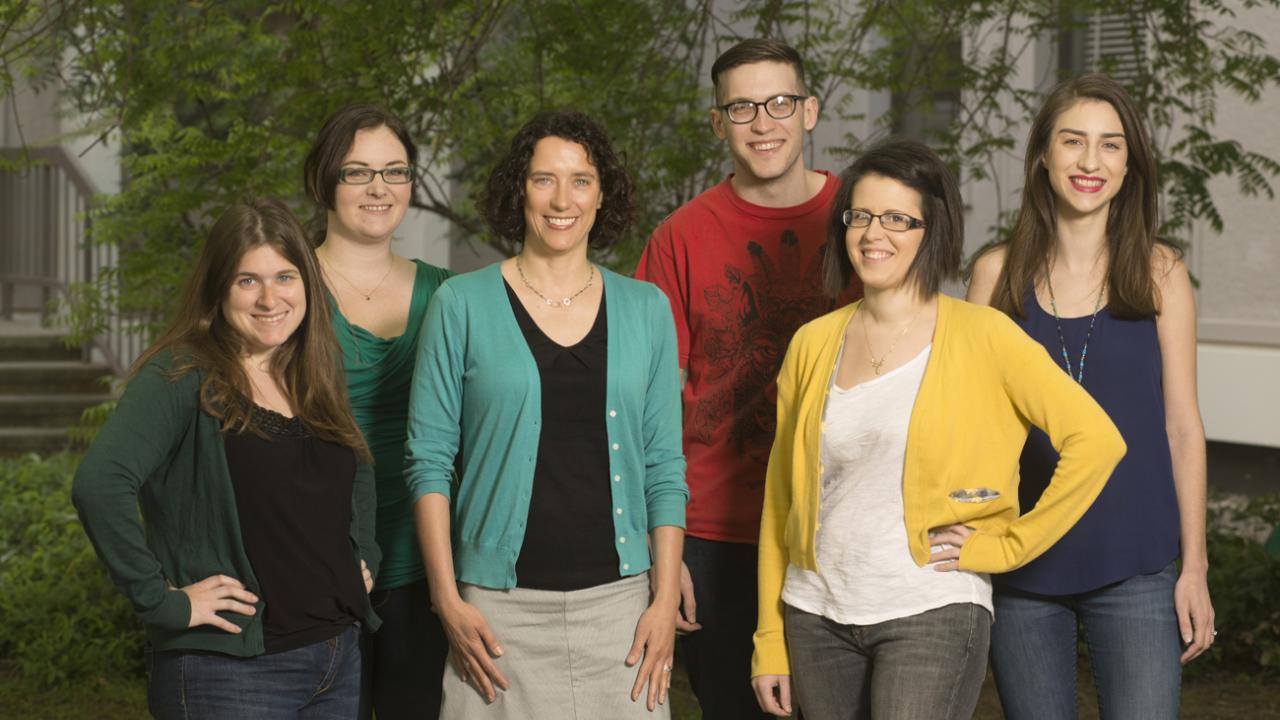
Mentoring Fellowship Awardees - Dr. Annaliese Franz and Mentees Brittany Armstrong, Kelsey Mesa, Julia Jennings, Kayla Diemoz, and Austin Kelly, Chemistry
What makes Dr. Annaliese Franz a great mentor?
Quick Summary
- Her coaching - providing her students critical feedback, cheering them on and celebrating their wins.
In the near-decade that Annaliese Franz has mentored both graduate and undergraduate students through her research lab, she’s seen an evolution of change, impact, and challenges. “We place an immense significance on mentoring, yet the word can be used differently by many people, and so the concept can become vague,” she says. She has adopted the best habits of her own mentors as well as utilized the resources of UC Davis’s Mentoring at Critical Transitions (MCT) program to be a better scientist, teacher and mentor. Franz’s fondness for sports and coaching analogies helped form the basis of her proposal, “Go Team! Mentoring for Success in Writing, Presenting, and Professional Development,” which won one of the first five MCT fellowships.
“A sports coach observes and analyzes what will make the individual or team more successful, develop their skills and reach their highest potential,” Franz explains. “I embrace the idea that at times I am a coach for my students: providing critical feedback, cheering them on and celebrating their wins.”
For her fellowship-winning proposal, Franz drew on her experience as a mentor in the inaugural Graduate Students of Color (GSOC) mentor/mentee program, which paired graduate students with new mentors, usually outside of their own department. This status quo shakeup led her to explore the value of encouraging her own graduate students to do much the same. But she also realized that without such programs, it might be intimidating for students to seek out mentors other than their own research advisors.
“I hope that by guiding students to build a mentoring team, this will redefine modes of mentoring that will make them more successful,” Franz says. “Students often overlook opportunities for professional development and don’t fully utilize resources on campus because they worry that they are not supposed to leave the lab.”
Under this umbrella, students need to identify at least one additional mentor and build up that relationship, so that they are comfortable consulting with this person on a regular basis about research, career, or other grad school-related issues. Other goals include building a stronger professional network, producing scientific presentations and writing publications, and presenting at one conference, at minimum. So far the conferences have included the ACS regional meeting in San Marcos, CA; the UC-wide chemistry conference in March; and the upcoming 2016 National Silicon Symposium in Portland, Oregon in June 2016.
Franz’s team gives unanimous accolades to Franz as its coach and champion, agreeing that the trifecta of professional development, networking, and communication is a critical foundation to future success.
Brittany Armstrong, a fourth-year grad student, draws inspiration from Franz’s enthusiasm for the work, infusing it into her own presentations. She also has more comprehensive ideas of how to expand her professional network. “The biggest benefit to having a mentor is the opportunity to meet people in my mentors' networks,” she says. “I have started expanding my network in the field I want to work, and making these connections will help my career.”
“My previous mentor told me to choose someone who not only cares about research but also your development as a scientist and future career,” says Kelsey Mesa. “I feel that Annaliese fulfills this wonderfully. Being mentored is and will make me a better a scientist.”
Julia Jennings says that the spectrum of PIs can run the gamut from “totally hands off to full dictator.” Franz navigates this by directs them forward and upholding high standards while checking in with them on how things are going in general (and to make sure they’re getting enough sleep). “I entered Annaliese’s lab as a first-generation student, so I won’t have any connections in industry or academia that I don’t make along the way,” she says. “But I have also learned to kindle those mentoring relationships I forgot I had.”
Kayla Diemoz agrees that the focus on networking has encouraged her to reach out to and foster relationships with industry contracts. “Annaliese has been a very good mentor for preparing presentations and writing manuscripts. The amount of effort she puts in to helping us reach our potential shows how much she really cares.”
Mentors who care are more impactful both immediately as well as in hindsight. “Seeking a mentor that you will be compatible with is a big part of research,” says Austin Kelly, who has past experience with mentors at various stages of their own careers. “Annaliese works very hard to ensure that our time in grad school is used to the best of our abilities and to prepare us for a future career in chemistry.”

